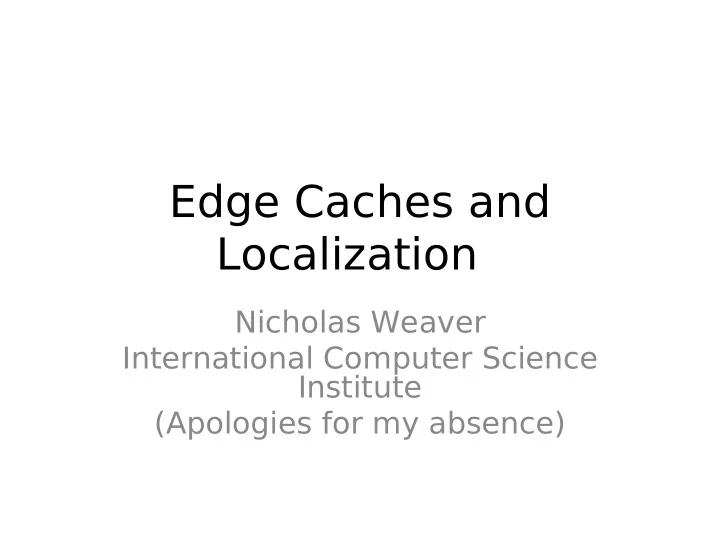

Edge Caches and Localization Nicholas Weaver International Computer Science Institute (Apologies for my absence)
Bulk data P2P shifts costs • By default, bulk-data P2P shifts the deliver costs from the content provider to the retail ISPs – All bits must come from someplace: in bulk-data P2P, it comes from other customers rather than the content provider • Creates a significant incentive for commercial bulk-data P2P – E.G. CNN now uses P2P extensions to flash for live streaming videos: Reportedly saves 30% in bandwidth costs for the content provider.
Localization alone may be insufficient • Localization removes transit costs for bulk-data P2P, but does not affect last-mile uplink costs – For many networks with shared uplinks (e.g. cable modems, wide-area wireless), last-mile uplink may be substantially more expensive than transit when under congestion – Even with localization, bulk-data P2P may substantially increase total costs for content delivery • Edge caches reduce last-mile uplink costs as well as transit costs – An edge-cache is simply a P2P node located in the ISPs network in the least-cost position for the ISP to deliver content – Edge-caches with P2P minimizes total network costs as well as content-provider costs • Unlike web caches, edge-based CDNs, or proxies, P2P edge- caches are fail safe, transparent to the user, and can be incrementally deployed
Edge Caches need Localization • Localization services should be aware of any edge caches – Drive user traffic to the edge-caches • Localization services should provide content discovery for edge caches – Localization should know what users are requesting, and edge-caches need to know this information to determine what to cache • Edge caches need localization services – An edge-cache should only allow free-riding peers which are in the ISP’s own network: localization provides this mechanism
And Don’t Worry (much) About Privacy in Localization Services… • Edge caches need to know and will discover who is requesting what files – Otherwise, this can’t work • Direct bulk-data P2P can never be privacy preserving! – Peers can always know a subset of other peers sharing the same file – Thus anyone who really wants to know can create a bunch of sibyls • As a result, privacy preserving for localization is probably overrated – If there is a tradeoff between privacy and utility, favor utility
Interaction with Local Trackers • Local trackers are just one possible protocol-specific localization service – All the requirements for a generic localization service still apply • It would be sensible to integrate a local tracker and a cache into the same system – Local trackers requires little state and little computation – Edge caches require a lot of state but little computation
Recommend
More recommend